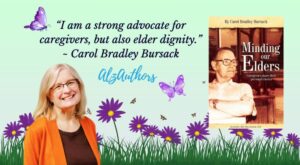Respecting the Right to Age With Dignity
The impact of aging frequently makes the news. Sadly, the coverage is consistently negative, and all facets of this topic are portrayed as “problems” that must be solved. However, what we do not see on the news with much regularity is how many vibrant seniors are living their lives on their own terms. Many of these older individuals express the desire for society to stop treating them as if they are useless and dispensable simply because they are aging.
Despite rapid growth in the number of Americans ages 65 and older, age-based stereotypes and discrimination still endure. Rather than tackling ageism as a whole, I wish to address how preconceived notions and fears influence family caregiving—especially as it pertains to adult children who are caring for their aging parents.
Older Care Recipients Are Treated Differently: Many people under age 65 need assistance from their relatives or other sources due to health problems and/or disabilities. In these instances, help is provided in a manner that emphasizes autonomy and independent living. But when it comes to older adults, something is just inherently different about the way we consider their need for support.
Consciously or not, family caregivers often step in to help their elders without fully understanding or appreciating their goals and preferences. We take charge of the situation and frequently wind up taking over. However, most age-related health conditions like arthritis or heart disease don’t automatically render an older adult incapable of making their own care decisions. Therefore, when we offer to help in these situations, our care recipients’ opinions and wishes must guide our efforts.
Perhaps this age-based difference in caregiving approaches exists because there is an unspoken assumption or hope that younger individuals still have so much to contribute, so much life left to live. We do not see them as frail or facing a losing battle against time.
When our parents are the ones getting older and needing more help, it complicates the dynamic further. Ideally, they were once our anchors. No matter how difficult life became, there was comfort in knowing that Mom and Dad were around, even if they lived halfway across the country.
Now, when we see their joints needing replacing, their skin wrinkling, perhaps even their memory recall slowing, we cringe. Whether or not we wish to admit it, we are afraid. We know that our parents are not immortal; one day we will be without them.
Acknowledging our parents’ vulnerability is painful for us, and we want to protect them from the indignities of old age for as long as possible. This is a noble aspiration…
Minding Our Elders: Caregivers Share Their Personal Stories. “For anyone having to walk the last segments of life with a loved one, read this.” …Delores
Shop Silverts Adaptable clothing:
Discover the Difference. EGOSAN – the Top-Rated incontinence brand from Italy. Now Available on Amazon.








